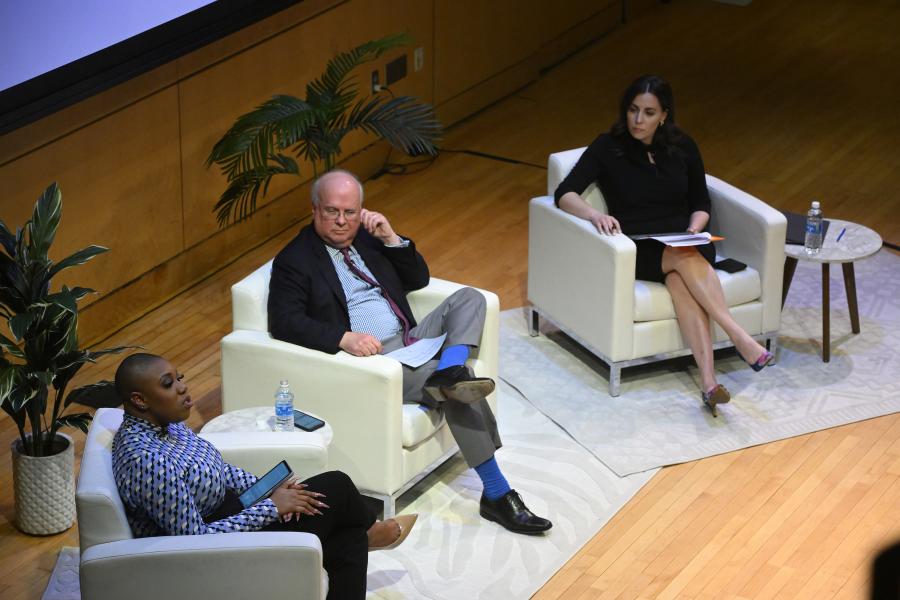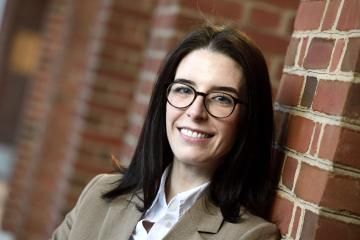At the outset of Wednesday night's debate, the audience was decidedly tilted. Polled on whether Congress should take action to secure voting rights for citizens, 91% resoundingly chimed in "yes."
By the end of the discussion—in which political strategists Karl Rove and Symone D. Sanders argued opposing perspectives—there was evidence of a slight but perceptible shift. Only 81% of the audience was now "yes," with nearly half of the crowd expressing some uncertainty about their positions.
"It's an interesting look, I think, at the way that we receive information, at the way we hear information that maybe syncs or doesn't sync with our predisposed notions walking into the room," said NBC news correspondent and JHU alum Hallie Jackson, who moderated the talk.
Closing out the 2023 Elijah E. Cummings Democracy and Freedom Festival, the voting debate was the first marquee event hosted by SNF Agora's new university debate initiative. The thought-provoking conversation between the two prominent political strategists centered on recent controversial changes to the Voting Rights Act of 1965, including the landmark Supreme Court case Shelby v. Holder and a current case involving redistricting laws in Alabama.
Image caption: Democratic strategist Symone D. Sanders-Townsend (center) and Republican consultant Karl Rove (right) debate states' control over voting rights, with NBC correspondent and JHU alum Hallie Jackson (left) moderating, at the Elijah E. Cummings Democracy and Freedom Festival
Image credit: Will Kirk / Johns Hopkins University
Sanders, a Democratic strategist who hosts the "Symone" show on MSNBC and previously served as a senior adviser to Joe Biden and Kamala Harris, argued that Congress must intervene to preserve key original tenets of the Voting Rights Act.
The law "cemented the idea that … voting rights [are] in fact a right for every single person in this country, regardless of where you are, your socioeconomic status, where you're from, where you live," she said. With Section 2 of the Voting Rights Act now under threat, she said, "I think Congress needs to do something about it."
"What makes the United States of America special—the cornerstone of our democracy—is free and fair open elections," Sanders said. "I think that there shouldn't be barriers to that participation. I think we should be making it easier for folks to access the ballots, not harder. And I think Congress has a role to play in doing this."
Rove, the architect of President George W. Bush's White House victories and now co-founder of the Restoring Integrity and Trust in Elections organization, underscored the importance of states' rights.
"If we waited for the federal government to come up with the perfect answer, we're kidding ourselves," he said. "States ought to be able to do what they think is best for their citizens of their state. And if it violates the Voting Rights Act or the 14th Amendment, then let the federal government sue, whether it's New York or Los Angeles, whether it's Atlanta or Houston."
Waiting on the federal government, Rove added, could drastically inhibit the ability of states "to experiment in changes in the election laws that they think might benefit participation in their states."
In teeing up Wednesday's debate, Johns Hopkins University President Ron Daniels pointed to inspiration from Elijah Cummings, the civil rights advocate and congressman who represented the Baltimore area from 1996 until his death in 2019.
"Crucially, Elijah never let ideological division turn into personal animosity," Daniels said. "He understood that in a democracy, disagreements about policy are not existential, and that showing respect and care for others is not equivalent to capitulating on core values or principles."
Posted in University News, Student Life, Voices+Opinion, Politics+Society
Tagged voting, snf agora institute, democracy









